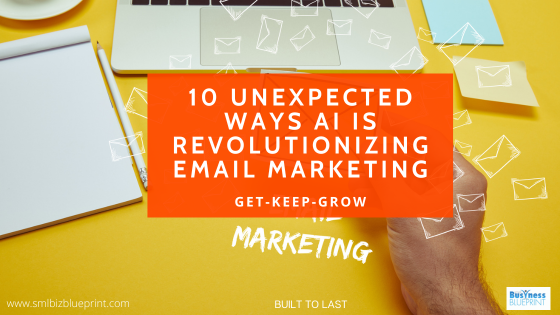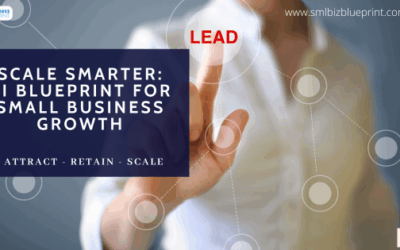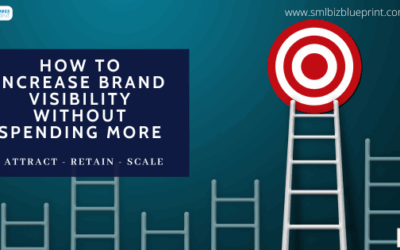In the current digital age, Artificial Intelligence (AI) is reshaping every facet of business operations, acting as a catalyst for growth and innovation.
One area where its impact is uniquely profound is in the realm of email marketing.
By enhancing efficiency, personalisation, and predictive capabilities, AI empowers small to medium-sized enterprises (SMEs) to overhaul their email marketing strategies and compete in a saturated digital marketplace.
This transformation is unfolding in ways many of us never anticipated.
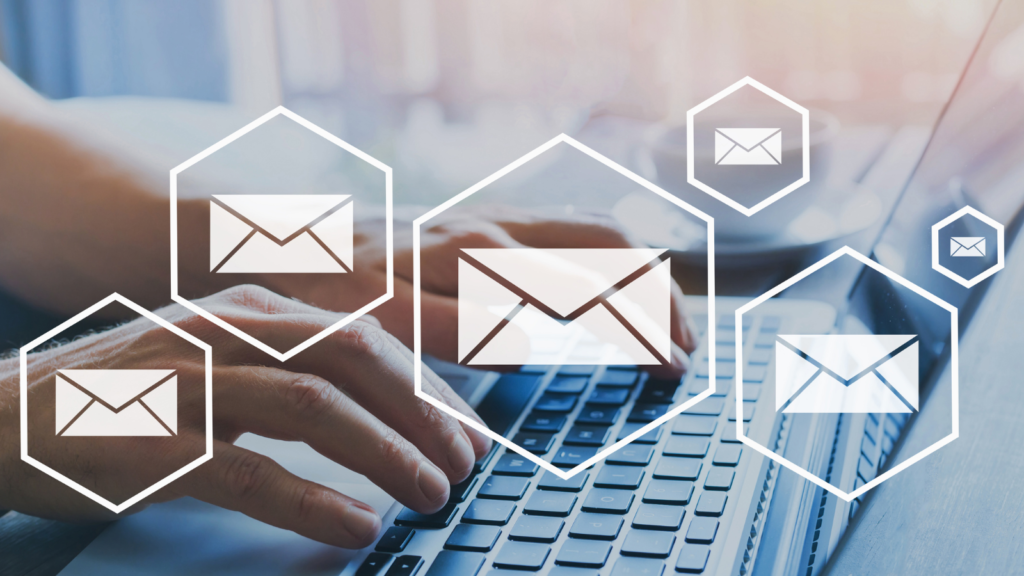
Let’s explore ten unexpected ways AI is revolutionising email marketing for SMEs.
#1 Personalizing Email Campaigns
AI’s capacity to curate personalised email campaigns is a game-changer for SMEs.
It leverages sophisticated algorithms to sift through customer data and deliver content that aligns with individual preferences.
A study by Experian found that personalised emails deliver six times higher transaction rates. AI can tailor subject lines based on user behaviour, tweak email content according to individual preferences, and even adjust send times when the recipient is most likely to engage.
This high level of personalisation enhances the user experience and, ultimately, the effectiveness of campaigns.
#2 Predictive Analysis:
The concept of predictive analysis is not new, but AI takes it to a new level.
AI leverages deep learning algorithms to study customer behaviour, anticipate future actions, and predict trends.
Businesses implementing predictive analysis in their email marketing strategies benefit from actionable insights that facilitate targeted marketing.
For instance, if an AI system predicts a customer is likely to purchase a product based on their browsing behaviour, businesses can send timely promotional emails to nudge the customer towards a purchase.
#3 Enhancing Customer Segmentation:
Customer segmentation is integral to any successful marketing strategy.
However, traditional segmentation methods can be time-consuming and often miss the mark.
AI simplifies this process by using machine learning to analyse vast amounts of data, offering insights into customer behaviour, preferences, and purchasing patterns.
This advanced level of segmentation allows SMEs to send targeted email campaigns that resonate more effectively with various customer groups.
In turn, businesses see increased engagement, improved customer retention, and a higher return on investment.

#4 Optimizing Email Timing:
The timing of email delivery can significantly impact open rates and engagement.
AI uses predictive analytics to study user behaviour and determine the best time to send emails to each recipient.
A study by GetResponse found that the highest email open and click-through rates occur at 10 a.m., and emails sent around this time have a 21% open rate. However, optimal send times can vary greatly among individual recipients.
By optimising send times, AI ensures your audience receives your message when they are most likely to engage, boosting open rates and driving more successful campaigns.
#5 Improving Email Content:
AI helps SMEs optimise their email content.
It uses Natural Language Processing (NLP) and machine learning algorithms to analyse which subject lines, calls to action, and types of content yield the highest engagement.
For instance, AI can detect patterns and identify that certain emotional triggers or power words in subject lines lead to higher open rates.
This data-driven approach to content creation helps businesses continually improve their strategies and create more impactful emails.
#6 Automated A/B Testing:
A/B testing is a traditional marketing technique that compares two versions of a webpage or email to see which performs better.
AI furthers this by allowing for automated multivariate testing on various email components such as subject lines, content, images, and calls to action.
An AI system can test multiple variables simultaneously, analyse the results, and automatically implement the highest-performing versions.
This leads to more effective campaigns and saves marketers countless hours of manual testing.
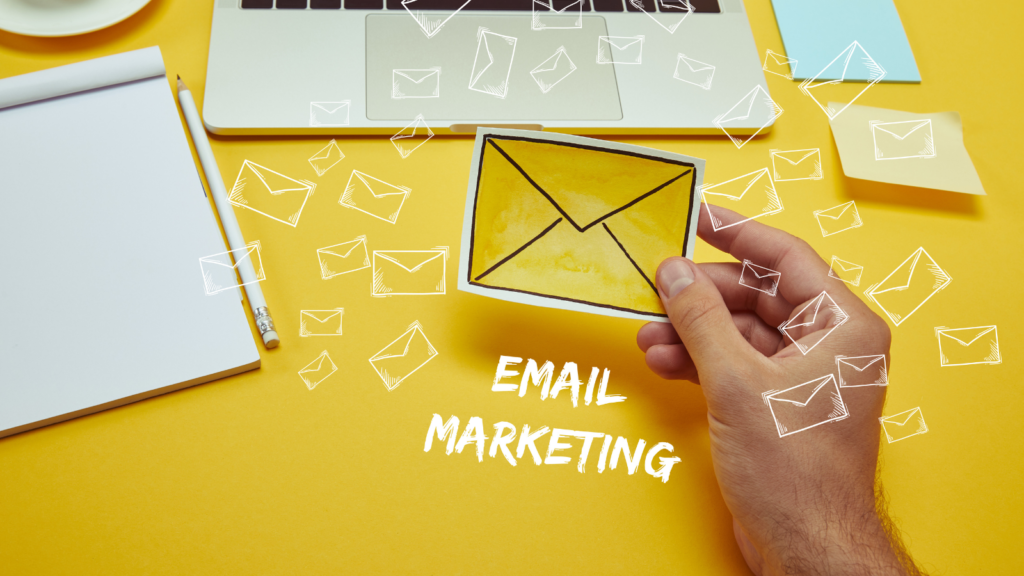
#7 Identifying Patterns and Trends:
AI has an uncanny ability to identify patterns and trends that might go unnoticed by human analysts.
By leveraging machine learning algorithms, AI can analyse past and present data to spot trends in customer behaviour, engagement levels, and purchase patterns.
This enables SMEs to fine-tune their email marketing strategies based on predictive insights, improving the relevance and effectiveness of their campaigns.
#8 Reducing Unsubscriptions:
Unsubscribing is the digital equivalent of walking out of a store, and it’s something businesses want to avoid.
Fortunately, AI can help here as well.
By analysing patterns, AI can predict which users will likely unsubscribe and identify potential causes. With these insights, businesses can adjust their email campaigns to reduce unsubscribes and enhance user satisfaction.
#9 Chatbots and Customer Service:
AI-powered chatbots are transforming customer service in email marketing.
These chatbots can interact with customers quickly, answering queries and providing personalised recommendations.
This improves customer service and increases engagement, as customers appreciate quick responses to their inquiries.
#10 Spam Filter Evasion:
AI can help emails bypass spam filters. It can analyse the characteristics of emails that often get flagged as spam and guide SMEs to create emails that are more likely to reach the recipient’s inbox.
This significantly improves the visibility of email marketing campaigns and ensures your messages get seen.

FAQs:
Q: How can SMEs get started with AI in email marketing?
A: Begin by leveraging AI-powered email marketing tools and software. These platforms can help automate and optimise various aspects of your campaigns.
Q: What is the ROI of using AI in email marketing?
A: AI can significantly enhance the effectiveness of email marketing, leading to higher engagement, improved customer retention, and an increased return on investment.
Q: What is AI in email marketing?
A: AI, or artificial intelligence, in email marketing refers to using machine learning algorithms and predictive analytics to create more effective email marketing campaigns. This can include everything from personalised content recommendations to optimised send times.
Q: How does AI improve email deliverability?
A: AI can improve email deliverability by analysing patterns and determining the best time to send emails to increase the chances of them being opened. It can also help maintain a clean email list by identifying inactive subscribers or invalid email addresses.
Q: Can AI help in creating personalised email content?
A: Absolutely! AI can analyse user behaviour and preferences to help create highly personalised email content. This can result in more relevant emails that resonate better with your audience and increase engagement rates.
Q: How does AI contribute to audience segmentation in email marketing?
AI can analyse various data points to create more detailed and accurate audience segments. This includes browsing history, past purchases, clicked links, and more. With this information, marketers can send targeted emails that better address the needs and interests of different audience segments.
Q: Is AI expensive to implement in my email marketing strategy?
A: The cost of implementing AI in your email marketing strategy can vary widely depending on the tools and platforms you use. While some advanced solutions may be expensive, there are also many affordable tools available that can provide valuable AI features for your email marketing efforts.
Conclusion:
The email marketing landscape is being dramatically transformed by AI, particularly for SMEs looking to scale and compete effectively.
From personalising campaigns and optimising send times to predictive analysis and enhanced customer service, AI is opening new frontiers in email marketing.
As technology evolves, these ten methods are just the tip of the iceberg regarding what’s possible. So, get ahead of the curve by incorporating AI into your email marketing strategy today.
Your bottom line will thank you.

